TL;DR
Although cannabis, often referred to locally as “ganja”, has deep cultural roots in Jamaica, it was only relatively recently, in 2015, that the drug’s laws were amended. Cannabis in Jamaica is decriminalized for medical and therapeutic uses, its cultivation in small amounts, and for the practices of the Rastafari religion. However, it remains illegal under international law.
| Recreational Use | Medical Use | |
|---|---|---|
| THC | Decriminalized | Legal |
| CBD | Decriminalized | Legal |
Introduction
Cannabis law reform is a significant issue globally, with many countries discussing legalization, decriminalization, or stricter controls. In this post, we’ll delve into the legal situation of cannabis in Jamaica.
Overview of Cannabis Legislation
Legalization refers to the process of removing all legal prohibitions against it. Decriminalization means it would remain illegal, but the legal system would not prosecute a person for possession under a specified amount. Medical use implies cannabis prescription for alleviating symptoms of various health disorders, and recreational use refers to personal consumption without a medical justification.
State-Specific Legal Details
Legal Status
In 2015, Jamaica’s cannabis laws were amended. Despite international laws deeming cannabis illegal, it is decriminalized for medical and therapeutic uses, small-scale cultivation, and for the Rastafari religious practices in Jamaica. However, public use and possession over two ounces (56.7 grams) is illegal and can result in penalties. (source)
Historical Context
Cannabis has deep roots in Jamaica, particularly with the Rastafari religion. Despite cultural acceptance, it was illegal until 2015 when laws were amended in part due to economic considerations.
Possession and Use
Although public consumption is still outlawed, individuals can have up to two ounces without criminal penalties. It’s legal to consume in a private residence or at a licensed medical or therapeutic facility. For openly smoking, a minor ticketable offense fine is given. For citizens 18 or older, consuming for religious purposes is allowed.
Cultivation and Distribution
Cultivating cannabis is decriminalized, with households permitted to grow up to five plants. Legal distribution channels include medical or therapeutic licenses facilities.
Enforcement and Penalties
In possession of more than two ounces, the offender could face criminal charges. However, the government’s focus has shifted towards international trafficking and large cultivation operations.
Medical Cannabis
Jamaica recognizes the therapeutic potential of cannabis. Registered medical companies are permitted to cultivate cannabis, make products, and operate dispensaries.
Social and Economic Impact
The decriminalization of cannabis has contributed to crime rate reduction and economic growth through medical cannabis exports and increased tourism.
Comparative Analysis
Compared to other countries in the Caribbean, Jamaica is a forerunner in relaxing cannabis laws. Despite international drug treaties complicating matters, Jamaica has proven flexible.
Future Outlook and Ongoing Debates
There are ongoing debates about full legalization, and a licensing authority has been established to regulate a lawful medical cannabis industry.
Conclusion
Cannabis laws in Jamaica are a delicate balance, walking a fine line between constraint and liberty. It remains to be seen how this approach will influence global cannabis legislation trends.





